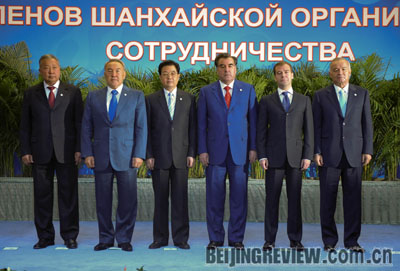|

SUMMIT ASCENT: Leaders of six member states of the Shanghai
Cooperation Organization meet in Dushanbe, Tajikistan, on August 28
Chinese President Hu Jintao visited Tajikistan and Turkmenistan on August 26-30, a tour that was designed to help cement China's bonds with these countries and promote harmony in Central Asia.
At the summit of the Shanghai Coopera-tion Organization (SCO) held in the Tajik capital of Dushanbe on August 28, Hu called on the organization's member states to address challenges together and share opportunities for development. They should join hands to build a "harmonious region of lasting peace and shared prosperity" as a long-term task for the SCO, he said.
Founded in Shanghai in 2001, the SCO groups China, Russia, Kazakhstan, Kyrgyzstan, Tajikistan and Uzbekistan. These countries cover an area of more than 30 million square km, about three fifths of Eurasia. Their population totals nearly 1.5 billion, representing a quarter of humanity.
With China's economy revving up, Central Asian countries are looking to the East for development assistance, said Chinese experts. The SCO is poised to play a central role in safeguarding the region's stability against complicated security threats, they added.
Branching out
"The SCO summit was a pragmatic meeting," said Chen Yurong, Director of the Department for SCO Studies at the China Institute of International Studies. "It dealt with security cooperation and economic development, the organization's two main functions."
Now that they have established a long-term objective and priorities for their economic cooperation, SCO member states are forging ahead step by step in this regard, she said.
The SCO formulated an outline for multilateral economic and trade cooperation at a prime ministers' meeting in Beijing in 2003, setting the long-term goal of realizing the free flow of goods, services, capital and technology among member states by 2020. At the Shanghai summit in 2006, member states identified energy, information technology and transportation as their priorities.
Central Asia has shown strong signs of economic resurrection in recent years, but various external factors are jeopardizing the region's potential, Chen said.
In the declaration issued after the Dushanbe summit, SCO leaders pledged to create a mechanism for joint assessment, prevention and response to external threats and challenges in light of the situation in Afghanistan as well as the increase in drug trafficking and rampant cross-border crime in the region.
| 